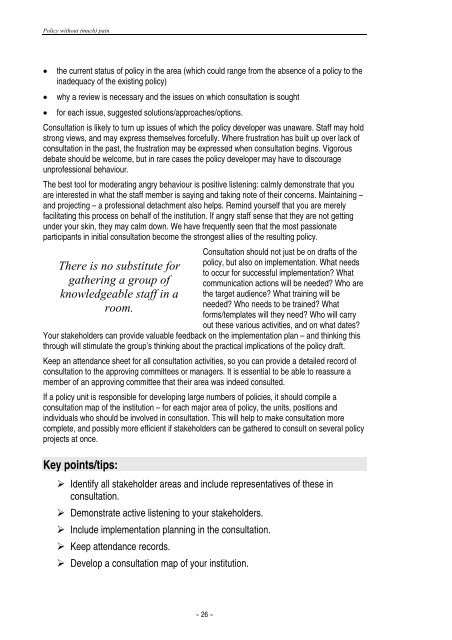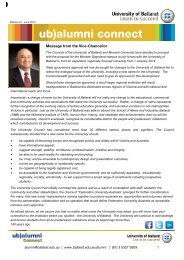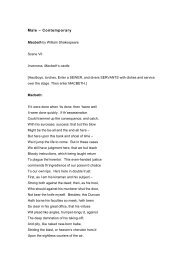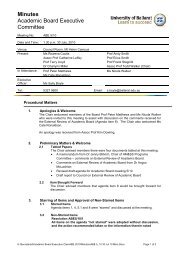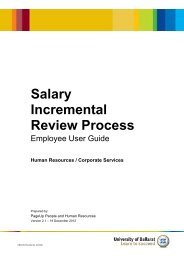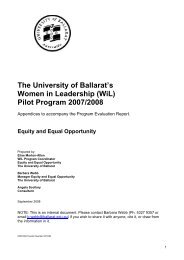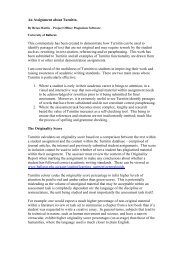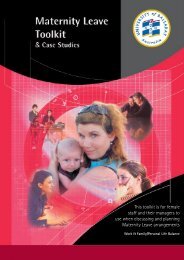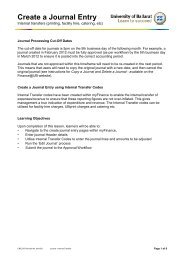Policy without (much) pain - University of Ballarat
Policy without (much) pain - University of Ballarat
Policy without (much) pain - University of Ballarat
- No tags were found...
You also want an ePaper? Increase the reach of your titles
YUMPU automatically turns print PDFs into web optimized ePapers that Google loves.
<strong>Policy</strong> <strong>without</strong> (<strong>much</strong>) <strong>pain</strong> the current status <strong>of</strong> policy in the area (which could range from the absence <strong>of</strong> a policy to theinadequacy <strong>of</strong> the existing policy) why a review is necessary and the issues on which consultation is sought for each issue, suggested solutions/approaches/options.Consultation is likely to turn up issues <strong>of</strong> which the policy developer was unaware. Staff may holdstrong views, and may express themselves forcefully. Where frustration has built up over lack <strong>of</strong>consultation in the past, the frustration may be expressed when consultation begins. Vigorousdebate should be welcome, but in rare cases the policy developer may have to discourageunpr<strong>of</strong>essional behaviour.The best tool for moderating angry behaviour is positive listening: calmly demonstrate that youare interested in what the staff member is saying and taking note <strong>of</strong> their concerns. Maintaining –and projecting – a pr<strong>of</strong>essional detachment also helps. Remind yourself that you are merelyfacilitating this process on behalf <strong>of</strong> the institution. If angry staff sense that they are not gettingunder your skin, they may calm down. We have frequently seen that the most passionateparticipants in initial consultation become the strongest allies <strong>of</strong> the resulting policy.There is no substitute forgathering a group <strong>of</strong>knowledgeable staff in aroom.Consultation should not just be on drafts <strong>of</strong> thepolicy, but also on implementation. What needsto occur for successful implementation? Whatcommunication actions will be needed? Who arethe target audience? What training will beneeded? Who needs to be trained? Whatforms/templates will they need? Who will carryout these various activities, and on what dates?Your stakeholders can provide valuable feedback on the implementation plan – and thinking thisthrough will stimulate the group’s thinking about the practical implications <strong>of</strong> the policy draft.Keep an attendance sheet for all consultation activities, so you can provide a detailed record <strong>of</strong>consultation to the approving committees or managers. It is essential to be able to reassure amember <strong>of</strong> an approving committee that their area was indeed consulted.If a policy unit is responsible for developing large numbers <strong>of</strong> policies, it should compile aconsultation map <strong>of</strong> the institution – for each major area <strong>of</strong> policy, the units, positions andindividuals who should be involved in consultation. This will help to make consultation morecomplete, and possibly more efficient if stakeholders can be gathered to consult on several policyprojects at once.Key points/tips:‣ Identify all stakeholder areas and include representatives <strong>of</strong> these inconsultation.‣ Demonstrate active listening to your stakeholders.‣ Include implementation planning in the consultation.‣ Keep attendance records.‣ Develop a consultation map <strong>of</strong> your institution.~ 26 ~


